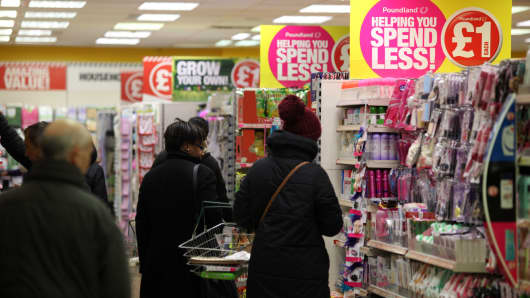U.K. pound shop chain Poundland said on Tuesday that it planned to cut its prices to 97 pence in some stores in an attempt to undercut rivals charging 99 pence for products.
The chief executive of Poundland told a retail industry magazine that the price cut was part of the company's "competitor response" strategy as rival 99 pence stores spring up on the U.K. high street and try to replicate the Poundland success story- at one pence less.
"It is those early weeks [when a rival opens] that are very important and if you can pop the balloon early we find that doing that rather than nothing at all is helpful," chief executive Jim McCarthy told the Retail Week publication on Tuesday. Poundland has introduced the price cuts in three of its stores in London and the West Midlands.
(Read More: UK Boom in Pound Shops: An Austerity-Proof Business)
"It sends the message that we're not a soft touch. It's a bit like when a supermarket has a competitor opening nearby. They have hosts of tactics to dampen the impact," McCarthy added.
Bob Parker, senior consultant at Credit Suisse, said the move highlighted retailer fears over increased competition.
"The overall thing is that you've got intense competition in the consumer staple sector and that is not going to go away," Parker told CNBC Europe's "Squawk Box." "It's competition among the majors, it's competition with organizations like Poundland and the big trend in buying from the internet."
"Where's the profitability?" Parker asked. "How do they make money by selling stuff at 97p?"
(Read More: Prince Harry— UKBusiness Ambassador?)
His comments come amid reports that Poundland's owner, private equity group Warburg Pincus, is considering a sale of the 400-store chain which it bought in 2010 for 200 million pounds ($304.6 million).
Warburg could sell the retail chain for as much as 600 million pounds($900 million), according to the Financial Times.
The Poundland chain which operates in the U.K. and Ireland is instantly recognizable because of its price point. The company's profits rose 22 percent in 2012 as cash-strapped consumers flocked to their stores in search of cheap - but well-known - brands.
-By CNBC's Hollly Ellyatt, follow her on Twitter @HollyEllyatt



